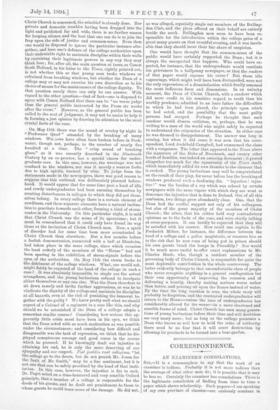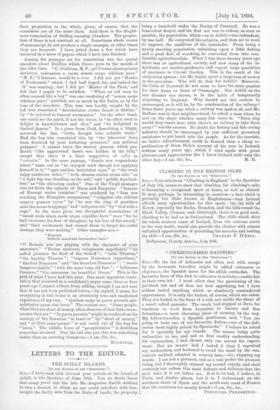CORRESPONDENCE.
AN EXAMINER'S CONSOLATIONS.
Sin,—It. is a commonplace to say that the work of an examiner is tedious. Probably it is not more tedious than the average of what other men do ; it is possible that it may be less so. Certainly the examiner has consolations. There is the legitimate consolation of finding from time to time a paper which shows scholarship. Such papers—I am speaking of my own province of classics—are curiously constant in their proportion to the whole, given, of course, that the examinees are of the same class. And there is the illegiti- mate consolation of finding amusing blunders. The propor- tion of these is not constant at all. Sometimes whole reams of manuscript do not produce a single example, at other times they are frequent. I have jotted down a few which have occurred in a mass of papers which I have just finished.
Among the passages set for translation was the quaint anecdote about Duillius which Cicero puts in the mouth of the elder Cato. "0. Duillium, M. F., qui Poenos claeseprimus devicerat, redeuntem a caena senem saepe videbam puer." " M. F.," I foresaw, would be a crux. I did not get "Master oF Foxhound " whieh I had half hoped for, and indeed the H was wanting ; but I did get Master of the Fleet,' and felt that I ought to be satisfied. "When an old man he often seemed like a boy" was one rendering of " senem saepe videbam puer," justified, not so much by the Latin, as by the tone of the anecdote. This tone was hardly caught by the lad who translated " delectabatur crebro funali et tibieine" by "be rejoiced in funeral ceremonies." On the other hand, one could see the spirit, if not the letter, in "he often used to delight in knucklebones and dice," and "he delighted in timbrel dances." In a piece from Ovid, describing a blight, occurred the line, " irrita decepti vote colentis erant." Had the boy who translated this by "the labourers have been deceived by your irritating promises," any political purpose P I cannot trace the Mental process which pro. duced the aggravated insect was hidden in the hills," except that there is a faint suggestion of cenis in " colentis." In the same passage, " fructn non respondente labori " came out as "he enjoyed work though not applying himself to it," " ager assidua luxuriabat aqua" as "the weak enjoy assiduous water," " levia obsess° stabat avena solo" as "a light fog was standing on the soil," and " gelidis Aquiloni- bus " as "the shivering eagles." One of the Virgil passages was set from the episode of Wiens and Euryalus. "Iamque ad Messapi smiles tendebat" was rendered by "Jam was reaching the Menapian companions," " religatos rite videbat carper° gramen equos " by "he saw the ring of gamblers seize the horse-trappings," and " religatos rite" by "tied with a rope." In the same piece two thoughtful translations of " sensit cairn nimia caede atque oupidine fern" were "for he had overcome his fear of slaughter by his fear of the sword," and "their excitement had caused them to forget the awful carnage they were making." Other examples are,— " Romane . . . . .
Delicta maiorum immeritus hies."
"0 Roman, you are playing with the character of your ancestors." "B scam malorum voluptatem appellabat," "he called pleasure the food of the wicked " ; "valet Theseus," "the healthy Theseus "; " impune Numanum (oppetiisse)," "the foul Numanus " and "the harmless Numanus " ; " omnia longaevo similis," "with the same long old face" ; " belluosus Oceanus," "the enormous (or bea.stlike) Ocean." This is the pick of what I have had this year. One most ingenious trans- lation that occurred in a candidate's paper some three or four years ago I cannot refrain from adding, though I am not sure that it has not been published before,—by myself, I mean, for everything in this letter is an absolutely true and unadorned experience of my own. " Quidam saepe in parva pecnnia per. spioiuntur quam sint levee." The version was : "Some people, when they are short of money, often discover of how little conse- quence they are." "In parva pecunia" might be rendered on the analogy of the Horatian "in tenui re" by "short of money," and "of little consequence" is not much out of the way for "levee." The middle force of "perspiciuntur" is doubtless somewhat strained. But the lad who put this was something better than an amusing blunderer.—I am, Sir, &O., EXAMINER.



































 Previous page
Previous page